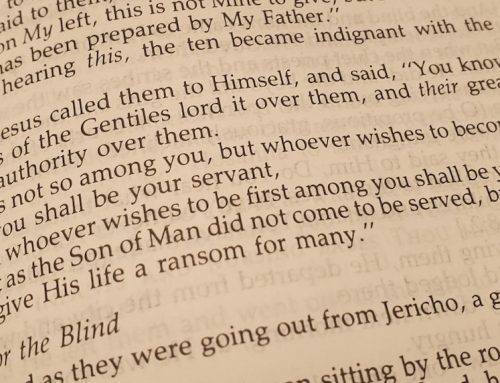- a set of ideas or beliefs that are taught or believed to be true
- teaching, instruction
- something that is taught
Perhaps it’s time to consider the Bible’s doctrine on doctrine. Before we can teach anything, we should give thought to what can and can’t be taught, right? What the Bible teaches about teaching should be what we teach about teaching, should it not?
“Doctrine” as used in the Bible is just a synonym for “teaching.” There is no separate meaning of “doctrine” as distinguished from “teaching” or “judgment.” Whenever something is taught, whether that’s a private opinion or supposed “judgment” of the church, it is a doctrine. The fact that it’s taught is what makes it a doctrine, not the fact that it was run up the flagpole and approved by superiors at a previous May/March Week.
Of course, the corollary of this is that any doctrines that have been taught in error–whether personal opinions or “judgments”–were erroneous doctrines. If they were taught by someone who wasn’t fully convinced of their veracity, then I believe that is the Biblical definition of “false teaching,” which is “disingenuous teaching.” Even more problematic for the church is the inevitable conclusion that the church, via its various spokespersons through the years, has in fact taught certain false (incorrect) doctrines. To argue that it hasn’t, is to argue for the infallibility of the church on those doctrines, which I don’t believe anyone is prepared to defend.
So what is the proper Biblical teaching about teaching? The meeting’s stated goals can be spun all they want to put lipstick on the pig, but it seems that any fair analysis would conclude that May/March Week is really about individuals discussing their private opinions, and bringing them back to the local congregations with the expectation that they will be adopted as the new “official doctrines.”
This line between private and “official” doctrine is not really Biblically supported, though. I believe there is no such thing as “official church doctrine,” Biblically speaking. We only have personal opinions–i.e. the beliefs we personally hold, as we individually understand them–and we are individually accountable for their truth and merit. We can’t slip responsibility for the veracity of what we believe or teach to “the church,” or “tradition,” or “our teachers,” or “May Week 1986.” Our opinions are ours alone, and if we choose to teach them, the buck stops there.
Because private opinions are fallible, they have no guarantee of being true. They may be true, of course, but they may not be. We arrive at various conclusions in life by adding to our knowledge, experience and maturity–physically, intellectually and spiritually.
This is a really important point. Since our opinions change throughout our lifetime (at least they should, if we are growing intellectually and spiritually), we can know that our private opinions have not always been true. We can therefore project into the future with a high degree of certainty that our opinions will never be 100% true. As long as we are encased in human flesh, we are likely to hold incorrect opinions.
However, each of us obviously believes that the opinions we currently hold true right now are in fact true, or we wouldn’t believe them. What are we to make of these two seemingly contradictory conclusions? We know we’re wrong on some things, but we’re not certain which things are wrong. We also believe and teach those things we think we’re right on.
What we need, then, is a proper sense of humility. We should not think so highly of our own opinions, believing them so strongly to be true that we take outlandish risks and preach them as if they were proven, verifiable fact. We have to acknowledge the possibility that we may grow in our opinions next week, next month, next year, or ten years from now, as long as we are not speaking infallibly directly from the Holy Spirit (and I know no one in the church who claims this).
We may have numerous logical or interpretational roadblocks in our path to apprehending what is actually true on a particular point, and this is true whether one has the Holy Spirit or not. As evidence, we just need to look at the sect’s history and see a series of many changed doctrines and opinions over time. These same people are believed to have had the Holy Spirit, so how did they arrive at different conclusions in 1978 vs. 1998? Because they’re human, that’s why.
Our opinions should not be forced on other people as a condition of fellowship. What my conscience allows or does not allow is not my job to enforce on my brothers. We can hold opinions, of course, but we must hold them as our own private property, as Alexander Campbell once said.
So at what point do our private opinions become doctrines? They become doctrines precisely at the time we teach them. This is true whether the “church” agreed that this opinion is the correct doctrine, or whether outside counsel was sought and approved it. The minute I take my opinion on, shall we say, whether a Christian may share a prescription contrary to the laws of the land, and teach it as the “official doctrine” of the church circa March Week 2014, I have made my opinions into my doctrine.
Instead, what Christians ought to do more of is share their opinions for the consideration and investigation of their brothers, and let their own consciences apprehend their truth (or not). “Let every man be convinced in his own mind,” right? But as soon as they go about teaching it, they are “teaching for doctrines the commandments of men.”
The reality is that we may believe our opinions are true with all our heart, but that doesn’t make them true or infallible. The whole concept of “official church doctrines” is impossible to define without making a creed of some sort, whether that’s a written statement of faith, or a body of “official thought” that is passed down verbally through teachers, evangelists, and May/March Weeks.
Does the church have a creed–a body of “official doctrines” outside of the Bible alone? I would suggest it does. It is embodied in 45 years of tape recordings, notes, May/March Week conclusions, judgements, and teachers’ counsel. It is, therefore, a house of cards:
Matthew 15:9 They worship me in vain; their teachings are merely human rules.
Colossians 2:22 – These rules, which have to do with things that are all destined to perish with use, are based on merely human commands and teachings.
It’s much better to build our doctrines on a solid foundation of the Bible alone. We’ve always told other religious organizations to do that. Stanton, remember the Suitcase of Books?






I wholeheartedly agree with you Kevin. How any Christian can deny the wrong of 'official church teaching' is baffling to me since the church constantly berates the religious world for this exact wrong doing. You have explained exactly what has been plaguing me for many years. I pray that eyes will be opened and hearts will embrace the truth of this erroneous practice. Keep writing.
Anon 4:07 – For the longest time it baffled me how they could deny their doctrines had ever changed when they so clearly had. Then it dawned on me that their definition of doctrine is not the same as the one everyone else uses. In their minds, their "judgements" have changed, but their "doctrines" have not. In order to make this work, however, you have to get into some outrageously Pharisaical lawyering. The simple fact is that a judgment is an opinion, and an opinion taught is a doctrine. Establish a set of doctrines as an organization and you have… Read more »
Excellent post Kevin. I agree with Anon 4:07, please keep writing!
Great blog Kevin, wonderful words of wisdom and I pray that hearts and minds will be opened to see and hear what you are trying to say. Keep writing!
Wow. Kevin, this is serious matters we are talking about in regards to "The Group". They do not believe they have personal opinions about the Doctrine of Christ, but Doctrine of Christ it is all back up by scriptures. Judgment are not opinions, but decisions thought carefully through using scriptures as to What God's will is in regards to situations. No different than what a Judge does in Court. They fully understand they will be judged and therefore, are carefully with what they teach and make sure it is backed up by scripture. At least that is the "The Group"… Read more »
You said: "They do not believe they have personal opinions about the Doctrine of Christ, but Doctrine of Christ it is all back up (sic) by scriptures." That is simply not borne out by the rules of logic. 1) The Doctrine of Christ, devoid of personal opinion, cannot change2) Their teachings have changed3) Therefore, their teachings cannot be the the Doctrine of Christ devoid of personal opinion Our only conclusion can be that their teachings are some mix of the Doctrine of Christ and/or personal opinion. You said: "Judgment are not opinions, but decisions thought carefully through using scriptures as… Read more »
Kevin, I completely understand what you are trying to state here about opinions and how it is mixed with their judgment and teaching. But for a member to be in this group, they can not take any teaching, any judgment, as opinion of man. It will cause havoc to their faith. God's will is not an opinion of man. God's will is God's will. I believe part of my recovery from this group is when I learned that God's will is to heed his greatest commandment.
Anon 4:36 – Yes, I understand that they can't take any teaching or judgment as an opinion of man and still remain in the group (at least in good standing). It will definitely cause havoc with their faith, but that's not a bad thing, because our faith should be based on truth, not contrived exegesis and word games.
And I totally agree that the best path to recovery is to understand the Greatest Commands. Amen to that, brother (or sister). 🙂
Wolves in Sheep's Clothing (saw this on the web) What is it about wolves that cause people to believe that wolves represent Jesus Christ? Here are some clues: Wolves come as innocent sheep. Wolves come as angels of light. Wolves seem friendly. Wolves smile. Wolves often have flattering titles. Wolves focus on their "authority." Wolves focus on giving them money. Wolves use the name of Jesus Christ falsely. Wolves often are obsessed with issues other than Jesus Christ. Wolves take scriptures out of context. Wolves twist scriptures to fit their purpose. Wolves sometimes are very strong personalities. Wolves sometimes claim… Read more »
Ezekiel 34:4 (KJV) (Read the whole chapter about the good shepherd – God). He will judge bad shepherds.
4 The diseased have ye not strengthened, neither have ye healed that which was sick, neither have ye bound up that which was broken, neither have ye brought again that which was driven away, neither have ye sought that which was lost; but with force and with cruelty have ye ruled them.
Great info: Earmarks of a cult
http://voices.yahoo.com/how-rescue-someone-cult-including-yourself-7507490.html
Well said Kevin! I would also like to add Romans 14, the whole chapter into this discussion. It would take up too much room to quote it all here, so please read it for yourselves. For brevity's sake I will only quote verses 2 and 3: "For one believes that he may eat all things: another, who is weak, eats herbs. Let not him that eats despise him that eats not; and let not him which eats not judge him that eats: for God has received him."This lets me know that it's ok to have a different opinion on something,… Read more »
Thanks Debby, I can tell you've been down some of the same paths in studying the scriptures to get out of the Stanton errors of thinking. Romans 14 and 15 were huge in my realization that unity does not mean unanimity. Unanimity is only possible via human oppression. If humans are allowed to think for themselves and exercise their own conscience commensurate with their level of knowledge and maturity, it is impossible to have unanimity. But unity is still commanded. That means they have an erroneous definition of unity, plain and simple.
You're right Kevin! Uniformity does not unity make! If we all dressed alike, spoke alike, walked in the same exact manner, we still wouldn't be united! 🙂
PS Thank you for the warm welcome! I'm glad that I found our blog, and get to meet all of you! Lynn, were you in the Tacoma congregation? If so, we know some folks in common!